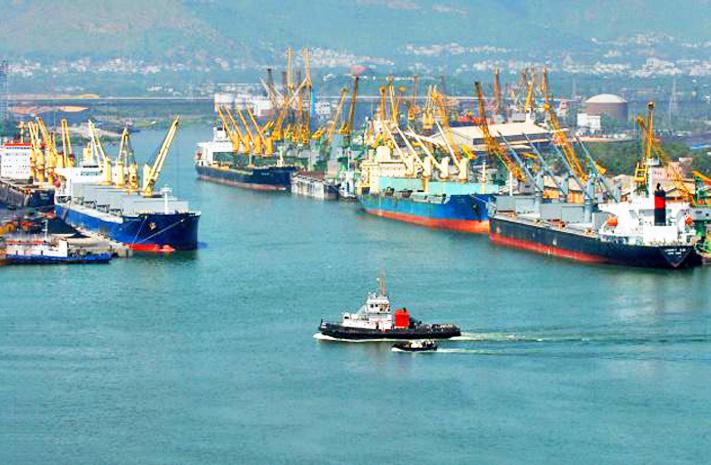3 Major Ports Buying DCI Is A Detour To Privatisation

After the Narendra Modi government was forced to shelve its plan of privatising the Dredging Corporation of India (DCI) — in the face of sustained resistance by workers, including one who committed suicide — the government is now getting three of the country’s cash-rich public-sector Major Port Trusts to buy stake in DCI instead.
Of the 12 Major Ports in India, three major port trusts — Paradip Port Trust (PPT), Visakhapatnam Port Trust (VPT) and New Mangalore Port Trust (NMPT) — are set to pick up the central government’s 73.47% equity stake in DCI along with management control.
It is reported by PTI that a Cabinet Note is expected soon on the matter.
On June 18, 2018, a meeting was held with the heads of these major ports, chaired by the Secretary to the Ministry of Shipping, Gopal Krishna, and the disinvestment proposal was discussed.
It was “suggested” — as the Minister of State for Shipping, Mansukh L Mandaviya, informed the Rajya Sabha in a written reply — that PPT, VPT and NMPT buy the stake, “based on the availability of surplus funds lying with them”.
The Shipping Ministry has set up a committee comprising the chairmen of the three port trusts to work out the modalities of the buy — including how much stake each of the three port trusts will acquire.
The asset valuer for the deal is Protocol Insurance Surveyors & Loss Assessors Private Limited — and the government is expected to get ₹1,500 crore out of the deal, as per DCI’s current share price, according to the Hindu Business Line.
Disinvestment Blues
This deal will obviously help the NDA regime, which has been trying hard to push privatisation of major ports, to get closer to its disinvestment target of Rs 80,000 crore for 2018-19.
And it follows the same pattern that the Modi government has been following of late — getting cash-rich public-sector companies to buy other public-sector companies, whether in the case of the ONGC-HPCL deal, which forced the ONGC to borrow a huge sum of money, or the LIC-IDBI deal, whereby LIC was made to acquire the sinking IDBI bank.
We’ve also seen the case of Air India, which was brought to its knees through a number of manoeuvres, including the merging of Indian Airlines with Air India, which were both highly profitable and market leaders in their own right.
Of course, this raises the question that — since disinvestment is supposedly meant to raise money for the public exchequer and help the government stick to its fiscal deficit target — is this the best way to raise finances?
As economist Prabhat Patnaik elaborates, this way of “fiscal consolidation” while pandering to private profit, is extremely damaging to the country in the long run.
On the one hand, the government continues giving massive tax concessions to corporates — amounting to Rs 86,145 crore in 2016-17 — and getting the public sector banks to write off bad loans of atrociously high sums (Rs 2.41 lakh crore between April 2014 and September 2017).
But on the other hand, the government continues to cut down its public expenditure, which actually affects employment generation, and then sells off the country’s national assets to profit-hungry corporates, or forces one government-owned company with surplus cash reserves to buy another — with the long-term aim of consolidating to privatise at one stroke.
It’s important to note here that DCI has never incurred losses ever since it came into existence in 1976, and is in fact ranked 5th in the world among dredging companies.
Headquartered in Visakhapatnam in Andhra Pradesh, the central public-sector company is also vital to the country’s maritime trade and the security of the Indian Navy operations, as it performs the crucial work of dredging. So why does the government want to sell it off in the first place? Just to reach its declared disinvestment target?
Privatising Ports
The move to sell DCI has been projected in a positive light in the media — at least one news report, while indicating that the ports were being “forced” to buy stake, spoke of the “advantage” that DCI would have as it “would stay in government hands”.
The deal would also “help ward off a possible backlash in the run-up to the 2019 polls, according to two people briefed on the plan,” the report added.
The plan to privatise DCI however, has invoked widespread opposition, even by the Andhra Pradesh government ruled by the Telugu Desam Party (TDP), which recently broke its alliance with the BJP-led NDA — thanks to the massive campaign undertaken by the DCI Non-Executive Employees’ Union and the DCI Officers Association in particular.
As pointed out above, the Modi government is already paving the way for the privatisation of major ports through the Major Ports Authorities Bill, 2016. The Bill is meant to replace the Major Port Trusts (MPT) Act, 1963. But it is still pending in Parliament, due to stiff opposition by the trade unions and employees of all Major Ports.
Following the opposition, the Bill was referred to the department-related Parliamentary Standing Committee, which gave its report to the Centre in July 2017 and in February 2018, the Cabinet approved some minor amendments to the Bill, but it has not yet come up for discussion in the Lok Sabha since then.
Speaking to Newsclick, Padmanabha Raju, general secretary of United Port and Dock Employees’ Union (affiliated to the Centre of Indian Trade Unions), said, “The Parliamentary Standing Committee took our viewpoints and apprehensions into consideration, and presented it before the government. But the Cabinet only made some very small changes.”
As per the Bill, a Major Port Authority Board will be set up to replace the existing Board of Trustees of Major Ports. These ports are under the control of the Ministry of Shipping, but the board of each port is still autonomous. However, the new Bill, in the name of increasing “autonomy”, gives more power to the central government while clearing the path for corporatisation of Major Ports, turning the port trust into a company — and making provisions meant clearly to privatise them, said Raju.
On the implications of some provisions under the Bill, Raju said, “The central government can give directions to the authority board, whether on a policy matter or otherwise, and the direction will be binding upon the board, even though the board is autonomous in name. This means that whenever the government decides to give away the major ports to any corporate company, they will simply issue an instruction and the ports can’t do anything.”
Another vital point that Raju raised is that the Bill allows, in effect, the sale of the port land.
“As per the MPT Act 1963, no assets or land belonging to a Major Port can be sold, these can only be leased for up to 30 years. But the new Bill has provision for the sale of land if the government wants,” he said.
“As for the lease, the board can give permission for lease of up to 40 years, but for lease beyond 40 years, the government has to give permission. And the Bill specifically mentions leasing of land even for non-port-related commercial activity, for which port land can be leased for up to 20 years by the board, but for a period beyond that government will give permission.”
The Major Ports have extremely valuable land in prime cities, totalling over 74,000 acres, said Raju, and alleged that “the corporates are after that land.”
Raju said the Parliamentary Standing Committee report had acknowledged the objection raised by the unions in this regard, and recommended that Section 34 (1) of the MPT Act dealing with immovable property be retained as it is in the new Bill — but the Modi government did not pay heed.
Then there is the provision regarding the investment of the reserve funds of the Major Ports (such as pension fund, gratuity fund, provident fund, etc.). As per the MPT Act, these funds can only be invested in nationalised banks. But the new Bill says funds can be invested in any scheduled bank.
This issue raised by the unions was also considered by the standing committee, which recommended that investment be made only in nationalised banks, but the only change the government made was that it said “any Nationalised Bank or any Scheduled Bank”, which amounts to the same thing.
Raju alleged that around three years ago, Shipping Minister Nitin Gadkari had met officials of ICICI Bank, Axis Bank and Yes Bank, and promised them that Rs 25,000 crore by the major ports would be deposited in these three banks.
The union leader said the port employees’ unions would continue to oppose the privatisation Bill.
Get the latest reports & analysis with people's perspective on Protests, movements & deep analytical videos, discussions of the current affairs in your Telegram app. Subscribe to NewsClick's Telegram channel & get Real-Time updates on stories, as they get published on our website.


















